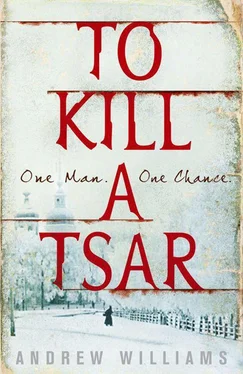‘Go through his pockets,’ said Barclay, nodding to one of the gendarmes at the door, ‘and the rest of you — turn this place upside down. Clothes, papers, anything, I want to see it all.’
He led Dobrshinsky into the dingy corridor: ‘Do you smoke, Your Honour?’
‘No.’
Taking a Sobranie from his cigarette case, Barclay rolled it gently between his fingers, squeezing the packed tobacco down into the black paper. He was a curious-looking man, in his late forties, short and a little overweight, with a ruddy clean-shaven face, heavy but perfectly arched eyebrows and thinning brown hair. He had spent ten years in the Gendarme Corps but still looked uncomfortable in its sky blue uniform, as if by some quirk of fate a man born to manage a bank had been miscast as a military policeman. He would be trustworthy in either capacity, Dobrshinsky thought, thorough and energetic and, when necessary, ruthless.
The bedroom door opened behind them and a gendarme sergeant stepped into the corridor and saluted. ‘We found this under the mattress, sir.’
Barclay took the small scrap of paper. Scrawled on it in pencil were six names: Kviatkovsky, Goldenberg, Presnyakov, Morozov, Mikhailov, Kovalenko.
‘Bronstein,’ said Barclay, handing the note to Dobrshinsky, ‘I recognise the hand. He must have hidden it.’
‘And the names?’
The policeman rubbed his chin thoughtfully with his chubby fingers. ‘Goldenberg is wanted for the murder of the governor general of Kharkov — and Presnyakov… Presnyakov has been living in exile for the last two years, after he murdered one of our agents.’
‘Perhaps Presnyakov is back in the city,’ said Dobrshinsky. ‘He may be involved in the new party Bronstein spoke of.’ He stood gazing at the names for a few more seconds then slipped the paper into his waistcoat pocket. ‘You will be hearing from me soon,’ he said, and nodding to Barclay he began walking down the hotel corridor in the direction of the staircase. The gendarme officer watched his bent shoulders for a moment and the image of a fox on hind legs flashed through his mind. Like the fox in the old folk tale, he thought, who seemed so mild and inoffensive but stole the fisherman’s food and appropriated the warmest corner of his home.
In the bedroom, his men were beginning to prise the floorboards from the joists. Bronstein’s body still lay crumpled on the rug.
From the opposite bank of the Fontanka river it looked like a nobleman’s mansion, and even those who passed beneath the delicate wrought iron canopy that hung over the pavement in front of its entrance were hard pressed to detect any clue as to its true purpose. And yet Fontanka 16 was one of the best known and — for all its elegance — least loved buildings in the city. Dobrshinsky had been given a large room on the second floor, with windows overlooking the river. The head of the Third Section of His Majesty’s Chancellery and Chief of the Corps of Gendarmes, General Drenteln was on the opposite side of the grand staircase, close enough to make his presence felt but a comfortable corridor away from the day-to-day business of his section. At first the general had resented the appointment of a special investigator from the Justice Ministry to his headquarters, but after only a few days it was evident to all in the building that he had gratefully accepted the excuse Dobrshinsky offered to delegate most of his work. And the special investigator did not blame him for taking the opportunity: who wouldn’t have done the same? It was a delicious irony that a force feared more than Baba Yaga herself and invested in the public imagination with some of the same supernatural powers was in reality so close to collapse. In a country renowned for the corruption and incompetence of its institutions, the secret police had distinguished itself by its inefficiency. The task of clearing this stable was now Dobrshinsky’s, and when there was time to reflect upon it he found himself close to laughing aloud. Protect the emperor and bring the nihilists to justice, and in the course of your work breathe new life into the Third Section — that, in so many words, was how von Plehve had put it to him. Failure would bring disgrace, of course. So General Drenteln was doing what any old soldier would do when faced with overwhelming odds — retreating with as much of his honour as he could salvage. It was Dobrshinsky’s lot to lead Les Enfants Perdus .
The clerks in the outer office jumped to their feet as he stepped through the door.
‘I want the files on these names now,’ he said, handing a clerk the scrap of paper.
Within the hour Agent Fedorov from Investigations was standing at the edge of his desk with the little the Third Section registry held on the men. Barclay was right, all of them but one were listed as ‘illegals’ wanted by the police, dangerous men capable of murder — capable of regicide. Kviatkovsky and Goldenberg had been seen last in Kiev, Presnyakov was thought to be living abroad — until now — and Morozov’s whereabouts were unknown. It was the fifth man, Mikhailov, who interested the special investigator the most: Alexander Dmitrievich Mikhailov. From a family of gentry, he was in his early twenties, educated in Petersburg, active in the student demonstrations in ’75 and reportedly the leader of a small cell of revolutionaries who styled themselves ‘Death or Freedom’. Clever and elusive, there was circumstantial evidence implicating him in the planning of the murder of the last Third Section chief the year before. There was no mention of a ‘Kovalenko’ in the section’s files, but clearly he was a member of the same group.
‘And we have this too.’ A single sheet of paper was trembling in Fedorov’s hand. ‘It’s from an informer.’
Dobrshinsky took the paper and glanced down at it quickly. The source was the man now lying in a crimson pool on the bedroom floor of a third-rate hotel on Nevsky. Bronstein had reported to his contact that Mikhailov had visited the Neva two days ago. He had taken Popov aside and spoken to him in a confidential whisper, and for a time Bronstein had been afraid that his role as an informer had been discovered. He had only just managed to quell a desperate urge to run from the room. But Mikhailov had been civil to him when he left, quite the gentleman — although such things were not meant to be of importance to socialists — and this had allayed his fears. Later, Popov had told them all that Mikhailov was an important revolutionary with ‘progressive’ views on ‘the struggle’ for freedom. Bronstein had taken this to mean he was an advocate of terror. One of the other men in the hotel room said he knew their visitor to be a friend of the man who attacked the tsar in Palace Square. Popov had flown into a rage at this, railing about the need for better security and for everyone to hold their tongues. And again, Bronstein had been frightened that the remark and the anger were directed at him in particular.
He had been right to be afraid, Dobrshinsky thought. His throat had been cut only hours after seeing his police contact for the last time.
‘I want descriptions, personal details, everything we have on these men circulated to police and gendarme stations,’ he said, looking up at the little agent. ‘Speak to their families, watch known associates. I want our agents to talk to their informers. These men will be living under false names and with false papers. Our people need copies of any photographs we have. I’m particularly interested in Alexander Mikhailov.’
‘Yes, Your Honour.’ Fedorov turned to leave. But as he was reaching for the door Dobrshinsky spoke again.
‘I want you to find another office on this floor — empty one if you have to. An officer will be joining me to help with this investigation.’
Читать дальше












